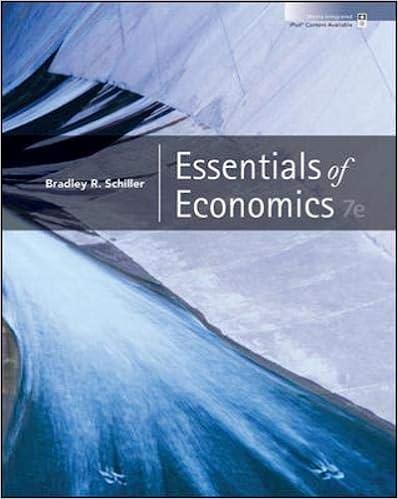Question
1. Suppose the equilibrium price for health insurance for a healthy person is $50 per month; and, the equilibrium price for an unhealthy person is
1. Suppose the equilibrium price for health insurance for a healthy person is $50 per month; and, the equilibrium price for an unhealthy person is $250 per month. Assume consumers of health insurance have perfect information as to their health status but suppliers of health insurance have imperfect information. Assume a seller of health insurance believes the probability that a given consumer is of good health equals .75 and the probability of poor health equals .25.
How does the informational imbalance result in adverse selection?
a. The expected price offered by the seller encourages only those with good health to purchase insurance. Hence only healthy people obtain insurance but at a higher price, which benefits sellers.
b. The expected price offered by the seller encourages only those with good health to purchase insurance. Hence only healthy people obtain insurance but at a discounted price, which harms sellers.
c. The expected price offered by the seller encourages only those with poor health to purchase insurance. Hence only poor people obtain insurance but at a higher price, which benefits sellers.
d. The expected price offered by the seller encourages only those with poor health to purchase insurance. Hence only poor people obtain insurance but at a discounted price, which harms sellers.
2. Suppose the equilibrium price for health insurance for a healthy person is $50 per month; and, the equilibrium price for an unhealthy person is $250 per month. Assume consumers of health insurance have perfect information as to their health status but suppliers of health insurance have imperfect information. Assume a seller of health insurance believes the probability that a given consumer is of good health equals .75 and the probability of poor health equals .25.
How does the informational imbalance result in market failure?
a. Only healthy people purchase insurance, hence the market under-provides insurance.
b. Only unhealthy people purchase insurance, hence the market under-provides insurance.
c. Both healthy and unhealthy people purchase insurance, hence the market over-provides insurance.
d. Both healthy and unhealthy people purchase insurance, hence the market efficiently-provides insurance.
3. Suppose the equilibrium price for health insurance for a healthy person is $50 per month; and, the equilibrium price for an unhealthy person is $250 per month. Assume consumers of health insurance have perfect information as to their health status but suppliers of health insurance have imperfect information. Assume a seller of health insurance believes the probability that a given consumer is of good health equals .75 and the probability of poor health equals .25.
Describe the potential of a death-spiral?
a. Occurs when insurance fails to adequately cover deadly illnesses and disease.
b. Only healthy people purchase insurance but pay above the marginal cost to cover them. This positive profit potential encourages entry by rival health insurance firms.
c. Both healthy and unhealthy people purchase insurance causing the health care market to remain stable.
d. Only unhealthy people purchase insurance but pay below the marginal cost to cover them. These losses results in exit by health insurance firms, resulting in future higher prices leading to fewer people purchasing insurance. The cycle continues until no insurance is bought or sold.
Step by Step Solution
There are 3 Steps involved in it
Step: 1

Get Instant Access to Expert-Tailored Solutions
See step-by-step solutions with expert insights and AI powered tools for academic success
Step: 2

Step: 3

Ace Your Homework with AI
Get the answers you need in no time with our AI-driven, step-by-step assistance
Get Started


